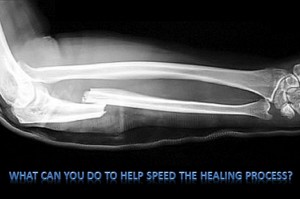 For most people, recovering from a broken bone is an exercise in patience. For an active person, being told that you have to significantly reduce or cease activity in order to let the bone heal is tantamount to torture. However, there are a few things you can do to help speed the healing process so you can get back to your normal activities as soon as possible.
For most people, recovering from a broken bone is an exercise in patience. For an active person, being told that you have to significantly reduce or cease activity in order to let the bone heal is tantamount to torture. However, there are a few things you can do to help speed the healing process so you can get back to your normal activities as soon as possible.
Stop taking NSAIDs for pain relief – When cells are damaged in a fracture, large amounts of prostaglandins are released. This is what causes the pain you feel, but it’s also are instrumental in the early stages of tissue repair. In order to alleviate pain, non-steroidal anti-inflammatory drugs stop the action of prostaglandins. This means that it’s a good idea to stop taking these as soon as possible after suffering a broken bone. Alternatively, you could take a non-NSAID pain medication such as acetaminophen for pain relief, as it does not have the same effect on prostaglandins.
Stop smoking – The broken bones of people who smoke take longer to heal. Smoking reduces blood flow, thus reducing the amount of nutrients and oxygen getting to the injury site. The chemicals released in the blood from smoking damage the cells that form bone and can significantly increase healing time or can prevent complete healing altogether.
Get more calcium, magnesium, vitamin D and vitamin K – These vitamins and minerals are all integral to healthy bone growth. We have all heard about how important calcium is in the diet, but if you take a lot of calcium without accompanying it with magnesium and vitamins D and K, much of that calcium will not be absorbed by your bones. Dark green leafy vegetables such as spinach, kale, collard greens and Swiss chard are among the best sources of not only calcium, but magnesium and vitamin K as well. If you live in a sunny climate, you can get a good supply of vitamin D by sitting in the sun for 15-20 minutes a day with arms and legs exposed and using no sunblock. For those who live in less sun-drenched locations (and those of us waiting out the winter months), you can get vitamin D from fortified milk products or you can take a vitamin D supplement.
Cut down on sugar and caffeine intake – Caffeine and sugar both increase the excretion of calcium from the bones by 25-50 percent. So lay off the coffee and doughnuts for a while!
Increase your protein intake – Nearly half of the compounds that make up your bones are comprised of protein. In order to give your bones the building blocks they need to speed healing and minimize further bone loss, incorporate more healthy protein into your diet, such as beans, nuts and fish or chicken.
If you keep these simple tips in mind, you may find yourself up and about before you know it!

